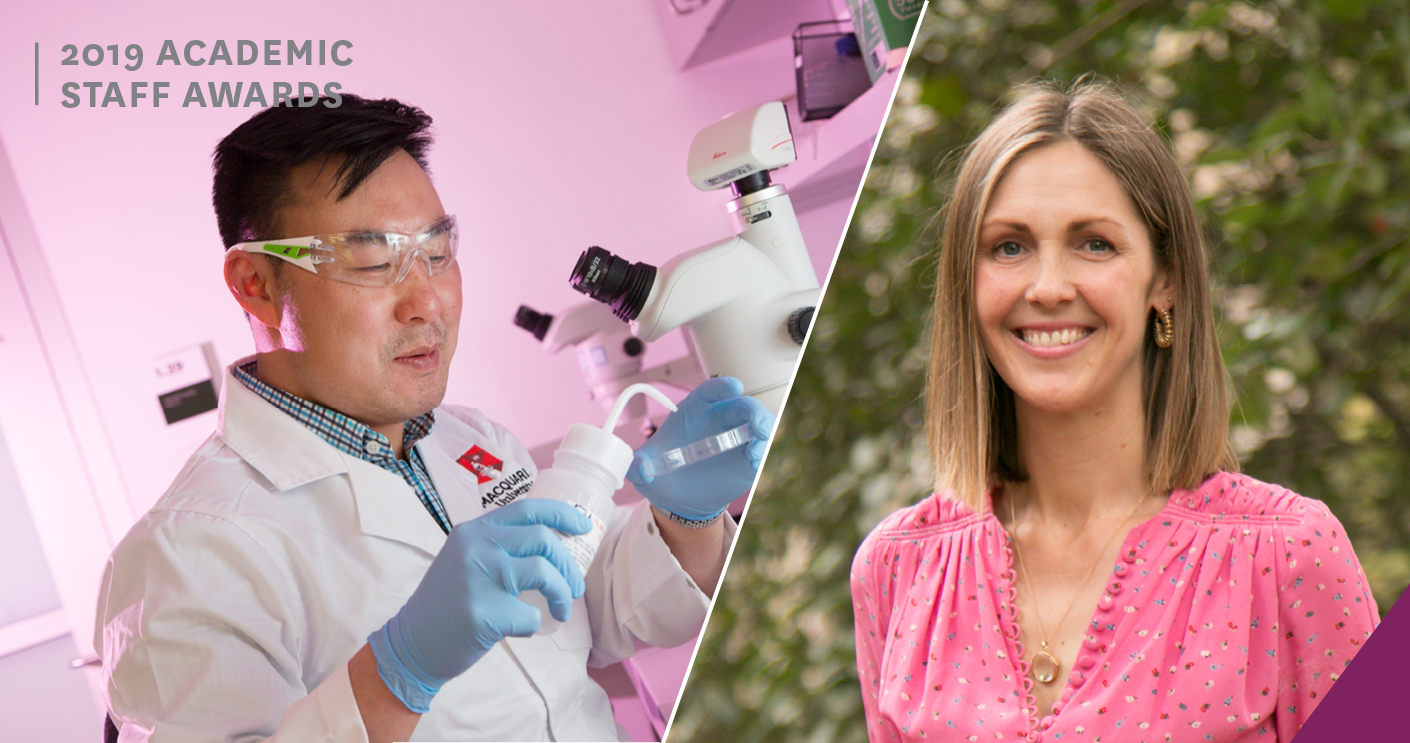In the lead up to the Academic Staff Awards, we will be profiling the amazing achievements of all of the finalists over the coming weeks.
This week, we take a look at the staff from the Faculty of Medicine and Health Sciences.
Research
 Professor Roger Chung
Professor Roger Chung
The Jim Piper Award for Excellence in Research Leadership
Professor Chung explains that his proudest career research achievement has been his relocation to Macquarie University as part of the establishment of the Macquarie University Centre for MND Research in 2013. Roger had previously led a 10-year research program at UTAS that had reached its natural endpoint, with his discovery of a potential nerve-regeneration molecule that was patented and licensed to a biotech company for commercial development (for nerve regeneration and Alzheimer’s disease).
“In considering a new research direction to embark upon, I was attracted towards research into Motor Neurone Disease (MND) and the exciting opportunity presented by the growing health and medicine enterprise at Macquarie University,” he says.
Roger’s current research program takes a multidisciplinary approach to unravelling the molecular origins of MND and uses this knowledge towards the pre-clinical development of new therapeutic strategies. He is currently the Professor of Neurobiology and Neurochemistry, leads a research group of 19 members, and since 2014 has held the position of Associate Dean (Research) in the Faculty.
 Dr Bingyang Shi
Dr Bingyang Shi
Macquarie University Early Career Researcher of the Year (STEMM)
Dr Shi is an NHMRC-ARC Dementia research development fellow. He is leading a Brain Drug Delivery research group (one Macquarie Research Fellow, two junior postdocs and three PhD students) as principal supervisor to develop advanced brain drug delivery systems to promote more effective brain disease therapy with reduced side-effects by overcoming biological barriers that limit the delivery of drug agents and therapeutic gene products into the brain.
“Drug therapies remain a key solution for fighting human disease,” Bingyang explains. “The complexity of targeted drug delivery, which entails traversing a number of biological challenges – such as keeping drugs stable in blood, preferentially targeting sick cells and crossing the Blood-Brain Barrier – requires both scientific and technical issues to be resolved before the full potential of effective therapy is realised. Therefore, smart/functional drug carriers are highly desired to help drugs cross tough biological barriers.”
During Bingyang’s research career, he has established a new toolbox of advanced brain delivery systems for targeted drug and gene delivery for various brain diseases including brain cancer, Alzheimer’s disease and Motor Neurone Disease, and assessed their pre-clinical therapeutic potential.
“These results have led to 52 peer-reviewed journal articles in top tier journals – including Nature Nanotech and Adv. Materials – as well as two book chapters,” he says.
“My recognised standing in the field is demonstrated by the substantial growth in publications, citations and conference invitations over the last five years, with over 1400 citations with an h-index of 18, and more than 20 invited conference talks.”
 Ms Stephanie Rayner
Ms Stephanie Rayner
Excellence in Higher Degree Research (STEMM)
In 2015, Ms Rayner was involved in the first study that linked mutations in the gene CCNF with Motor Neuron Disease. The gene, CCNF, encodes for a protein known as cyclin F which plays an important role in healthy cell function as it helps to send old proteins for degradation. These proteins are known as ‘substrates’ of cyclin F.
“At the time, only a handful of cyclin F substrates were known,” Stephanie explains. “Many of these had roles in cell division or has been involved in cancer. This makes cyclin F a key regulator of the cell cycle. Thus, a major component of my research has been to understand the role cyclin F plays in neurons, and how a single gene mutation may lead to a devastating neurodegenerative disease.”
Stephanie explains that her research has involved multi-disciplinary collaboration between clinicians, geneticists, cell biologists and proteomics experts like herself.
“Within this team, I have been involved in understanding the link between cyclin F mutations and neurodegeneration, primarily using a series of biochemical assays as well as proteomic workflows.”
Learning and Teaching
 Dr Joel Fuller
Dr Joel Fuller
Vice-Chancellor’s Learning and Teaching Student Nominated Award
Dr Fuller believes that optimal learning occurs when students feel inspired to learn, but also safe, supported and respected throughout the process.
“This philosophy underpins my teaching,” he says. “Future health professionals must understand and apply complex concepts, and these concepts can intimidate students if they are not presented in a clear and calm manner that scaffolds student learning, whilst allowing them to feel comfortable exploring the inherent challenges involved in grasping these concepts.”
An example of this occurs when teaching PHTY802 as students are presented with material on complex pain neurophysiology.
“This can overwhelm students,” Joel explains. “So, I facilitate a warm, comfortable environment where we explore content as a group, allow time for content to be absorbed and facilitate deeper learning through enquiry and questioning.”
 Ms Alexandra Bhatti
Ms Alexandra Bhatti
Vice-Chancellor’s Learning and Teaching Student Nominated Award
Vice-Chancellor’s Learning and Teaching Early Career Award
Ms Bhatti says teaching her students is incredibly rewarding and she is passionate about building those connections. As an early-career teaching fellow in the Macquarie Master of Public Health (MPH), Alexandra has the privilege of working with one of the most diverse student cohorts in our university.
“Designing and delivering learning experiences that caters to significant student diversity in literacy, education, culture and work backgrounds is a challenge I enthusiastically embrace,” she says. “Cementing student engagement early in our program is imperative for motivating and setting up students for continued engagement. As such, I focus on ensuring that students’ early experiences with the course are appealing, captivating and inspiring.”
Over the past three and a half years as the unit convenor of two core units within the MPH, Alexandra has developed and prepared entirely new curricula that provides engaging, inspiring and transformative learning experiences for all of her students. These experiences foster student development and build employability skills from early in the program, with tasks that are work-integrated and authentic.
 Professor Catherine Dean
Professor Catherine Dean
Vice-Chancellor’s Educational Leader Award
Educational leadership has been a central focus for Professor Dean since commencing with the University as a key appointment in the expansion of health and medicine. Catherine adopts a ‘servant leadership’ philosophy, embodying her personal commitment to lifelong learning and reflective practice as well as her ambition to develop and empower others to ensure optimisation of transformative educational opportunities.
“My work is underpinned by strength-based actions that align with the values of the University and MQ Health,” she explains. “My scholarly interest in health professional education is underpinned by my belief that one of the most effective ways to transform healthcare is through the education of future health professionals – more than the latest evidence-based knowledge and stellar technical skill – but education which is lifelong and puts people and care at the centre.”
Catherine’s leadership in curriculum design, development, implementation and enhancement is exemplified by the establishment of the first Doctor of Physiotherapy (DPT) course in NSW, along with the accompanying establishment of the Department of Health Professions, and an outstanding team of academic and professional staff.
“The DPT embodies the University’s vision for a ‘Connected Learning Community’. I secured over $1.3 million from Health Workforce Australia to develop an innovative sustainable clinical component which included design of the Health and Wellbeing Collaboration – enabling early experiences with volunteers.”
Celebrate with your colleagues
Don’t forget to register your attendance for the event today!
The Academic Staff Awards will be held on Monday 18 November from 3pm to 5.30pm in the Graduation Hall (14 Sir Christopher Ondaatje Avenue).


 Back to homepage
Back to homepage
Comments
We encourage active and constructive debate through our comments section, but please remain respectful. Your first and last name will be published alongside your comment.
Comments will not be pre-moderated but any comments deemed to be offensive, obscene, intimidating, discriminatory or defamatory will be removed and further action may be taken where such conduct breaches University policy or standards. Please keep in mind that This Week is a public site and comments should not contain information that is confidential or commercial in confidence.